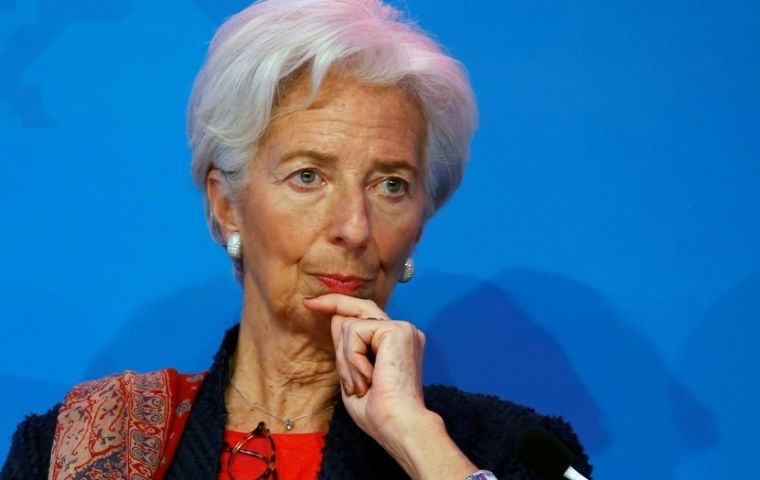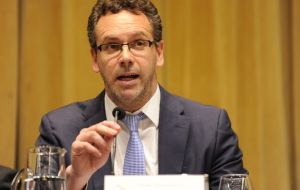MercoPress. South Atlantic News Agency
Argentine Peso with trading band and zero growth monetary supply policy
 Subject to IMF board approval, financing would no longer be discretionary, but would be readily available to the government for budget support, said Lagarde
Subject to IMF board approval, financing would no longer be discretionary, but would be readily available to the government for budget support, said Lagarde  Argentina’s new BCRA governor, Guido Sandleris, said the bank would establish a trading band for the peso and only intervene in the market if it fell outside range
Argentina’s new BCRA governor, Guido Sandleris, said the bank would establish a trading band for the peso and only intervene in the market if it fell outside range The International Monetary Fund Managing Director Christine Lagarde, speaking at a news conference in New York alongside Argentine Economy Minister Nicolas Dujovne, said IMF was “significantly frontloading” disbursements under the program adding the Argentine central bank had agreed as part of the deal to allow the peso currency to float freely and would only intervene in the foreign exchange market in extreme circumstances.
The central bank has spent nearly US$ 16 billion in reserves this year in a failed attempt to prop up the peso, using a large share of the dollars disbursed by the IMF so far.
“In the event of extreme overshooting of the exchange rate the central bank may conduct a limited intervention to prevent disorderly market conditions,” Lagarde told reporters.
Subject to IMF board approval, financing under the new deal would no longer be discretionary, but would be readily available to the government for budget support, she said.
Speaking at a later news conference in Buenos Aires, Argentina’s new central bank governor, Guido Sandleris, said the bank would establish a trading band for the peso and only intervene in the market if it fell outside that range.
Sandleris, appointed on Tuesday after his predecessor unexpectedly resigned, said the range will initially be set at 34 to 44 pesos to the U.S. dollar. It will depreciate daily at a rate equivalent to 3.0 percent per month, he said.
Any intervention in the market outside that range would be capped at US$ 150 million a day, Sandleris said, far less than the bank spent on many days in recent months.
The peso closed at 38.5 to the U.S. dollar on Wednesday.
In a far-reaching overhaul of monetary policy, Sandleris also said the central bank would abandon its inflation target of 27% for this year and instead set an objective of limiting money supply. The bank will target zero growth in the monetary base from now until June 2019, he said.
The central bank has already hiked benchmark interest rates to 60% in an effort to curb inflation, which is now predicted to top 40% this year. However, with credit accounting for a small share of economic activity in Argentina after decades of financial crises, interest rates have a limited impact on price rises.
“At this time, Argentina needs a simple anchor. Our anchor will be a very strict control of the amount of money in the economy,” Sandleris said, adding that it would require months for the new policies to have an impact on prices.
But the monetary base has been growing at a brisk 2% a month and the policy could have a negative economic impact, said Santiago Lopez Alfaro, an economist and associate at Delphos Investments. “That is very restrictive in an economy that is in recession and with high rates, with economic activity hit hard,” he said.




Top Comments
Disclaimer & comment rules-

-

Read all commentsWhat could possibly go wrong?
Sep 27th, 2018 - 05:32 pm +1Summarizing:
Sep 28th, 2018 - 11:25 pm -2President Macri's main strategy has been to borrow abroad as much as he possibly could, with the money going mostly to keep the lights on - until investors thought Argentina had borrowed more than prudence allows, and abruptly stopped lending.
As soon as this happened, Macri ran to the IMF to keep borrowing. The money now being facilitated to Argentina will ensure the country makes its debt repayments in time - nothing else.
This means in the end Argentina will find itself owing to private investors plus to the IMF, and with its capacity to generate currency greatly reduced as the recessive effects of the measures imposed on Argentina bring its real economy to a stand still.
Argentines now begin to taste Macri's original plan, which is to shrink the economy and reduce the country's labour costs to third-world levels - this is when the chickens may come home to roost.
Commenting for this story is now closed.
If you have a Facebook account, become a fan and comment on our Facebook Page!